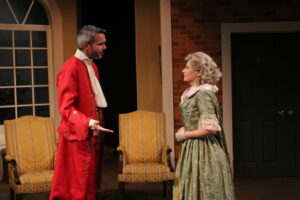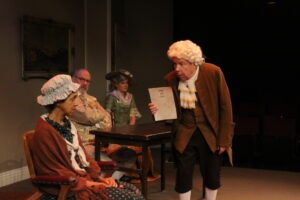
Kristal Dickerson, John Combs, Catherine Bruhier (all photos by Ryan Rowles)
As part of the two-show repertory opening its 57th season, Beverly Hills’s Theatre 40 is presenting the World Premiere of Marion J. Zola’s One Moment of Freedom. It’s an interesting snapshot of a little-known incident in American history. In 1781, a female slave in Sheffield, Massachusetts sued her owner for her freedom under the newly adopted state constitution. Unlike their counterparts in the plantation heavy South, Northern slaves, who were far fewer in number, were mostly household servants, used as cooks, maids, nannies, coachmen, etc. They were housed and fed much like the family that owned them. After being burnt by a red-hot poker to spare her 17-year-old daughter Lizzie (Kristal Dickerson) from punishment by her tempestuous young mistress, Bet (Catherine Bruhier) runs away to an understanding couple who are closet abolitionists. Even though lawyer Sedgwick (Michael Robb) feels compelled to return her to her owner, and his close friend, he decides to take her case and sue for freedom.

Joe Clabby, Katyana Rocker-Cook.
Bet is determined to not spend one day more as a slave and chooses jail time over returning to work for her kindly owner, former judge Col. Ashley (John Combs), whose daughter Alison (Katyana Rocker-Cook) is the real villain of the piece. Alison’s fiancé, Tapping Reeve (Joe Clabby), whose law education was financed by Ashley and who is in a law partnership with Sedgwick, finds himself caught in the middle. Mandy Fason, as Pamela Sedgwick, gives support and comfort both to her husband and the aggrieved slaves. Jeffrey Winner as defense attorney Noble adds some sly Perry Mason-style courtroom antics and provides some much-needed humor to the dry proceedings. Linda Alznauer directed, and Michael Mullen designed elaborate and colorful period costumes.

Catherine Bruhier, John Combs, Katyana Rocker-Cook, Jeffrey Winner
The play’s second act features the trial and the aftermath. Instead of ending the play with the jury’s verdict or with the outcome of the appeal, Zola continues with about three scenes too many. She still has Bet recount her and the other characters’ history for decades to come, just as she had her address the audience at the beginning of the play. The action of those final three scenes could effortlessly be placed in that final curtain speech instead of dragging out the show’s run time. As a first staging, the play does shine the light on a little-known piece of Americana. The focus just needs to be tightened and the history seminar tone of itsoftened.








